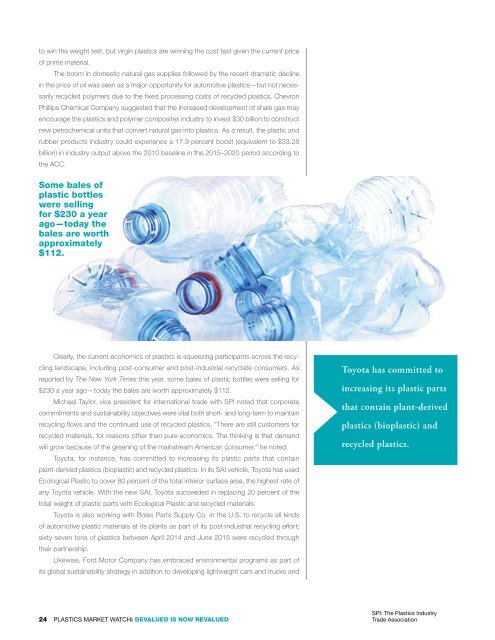Recycling Devalued is now Revalued
1SPybsx
1SPybsx
Create successful ePaper yourself
Turn your PDF publications into a flip-book with our unique Google optimized e-Paper software.
to win the weight test, but virgin plastics are winning the cost test given the current price<br />
of prime material.<br />
The boom in domestic natural gas supplies followed by the recent dramatic decline<br />
in the price of oil was seen as a major opportunity for automotive plastics—but not necessarily<br />
recycled polymers due to the fixed processing costs of recycled plastics. Chevron<br />
Phillips Chemical Company suggested that the increased development of shale gas may<br />
encourage the plastics and polymer composites industry to invest $30 billion to construct<br />
new petrochemical units that convert natural gas into plastics. As a result, the plastic and<br />
rubber products industry could experience a 17.9 percent boost (equivalent to $33.28<br />
billion) in industry output above the 2010 baseline in the 2015–2020 period according to<br />
the ACC.<br />
Some bales of<br />
plastic bottles<br />
were selling<br />
for $230 a year<br />
ago—today the<br />
bales are worth<br />
approximately<br />
$112.<br />
Clearly, the current economics of plastics <strong>is</strong> squeezing participants across the recycling<br />
landscape, including post-consumer and post-industrial recyclate consumers. As<br />
reported by The New York Times th<strong>is</strong> year, some bales of plastic bottles were selling for<br />
$230 a year ago—today the bales are worth approximately $112.<br />
Michael Taylor, vice president for international trade with SPI noted that corporate<br />
commitments and sustainability objectives were vital both short- and long-term to maintain<br />
recycling flows and the continued use of recycled plastics. “There are still customers for<br />
recycled materials, for reasons other than pure economics. The thinking <strong>is</strong> that demand<br />
will grow because of the greening of the mainstream American consumer,” he noted.<br />
Toyota, for instance, has committed to increasing its plastic parts that contain<br />
plant-derived plastics (bioplastic) and recycled plastics. In its SAI vehicle, Toyota has used<br />
Ecological Plastic to cover 80 percent of the total interior surface area, the highest rate of<br />
any Toyota vehicle. With the new SAI, Toyota succeeded in replacing 20 percent of the<br />
total weight of plastic parts with Ecological Plastic and recycled materials.<br />
Toyota <strong>is</strong> also working with Boles Parts Supply Co. in the U.S. to recycle all kinds<br />
of automotive plastic materials at its plants as part of its post-industrial recycling effort;<br />
sixty-seven tons of plastics between April 2014 and June 2015 were recycled through<br />
their partnership.<br />
Likew<strong>is</strong>e, Ford Motor Company has embraced environmental programs as part of<br />
its global sustainability strategy in addition to developing lightweight cars and trucks and<br />
Toyota has committed to<br />
increasing its plastic parts<br />
that contain plant-derived<br />
plastics (bioplastic) and<br />
recycled plastics.<br />
24 PLASTICS MARKET WATCH: DEVALUED IS NOW REVALUED<br />
SPI: The Plastics Industry<br />
Trade Association


